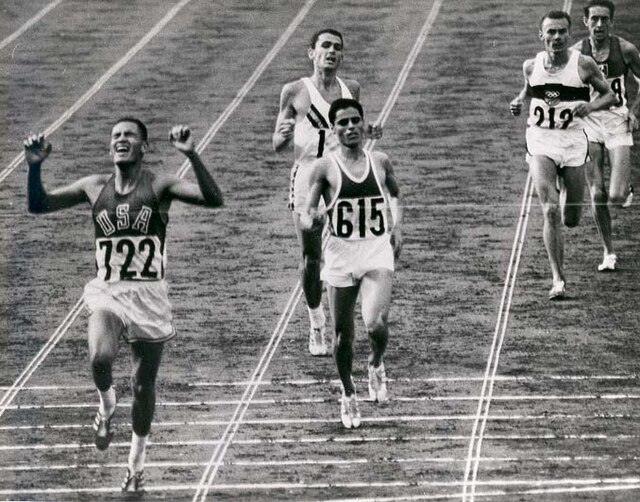The story of Billy Mills’ battles against loss, discrimination and uncertainty to become one of the most unexpected Olympic champions in 1964.
Imagine your chances of victory being so slim, that once you had conquered every challenge in front of you to achieve the unthinkable, not many even knew who you were.
These were the words said to Billy Mills after his gold medal in the men’s 10,000 metre final at the Tokyo Olympics in 1964 – a feat so extraordinary that once his victory was confirmed, even some of those running the event had never heard of him.

You would be hard pressed to find someone more befitting of the underdog title than Mills. Born into a Native American family, he was raised in a tribal reservation for large parts of his childhood. Despite this, Billy spoke lovingly of his parents, who raised their son through ‘traditional grounding’ in a difficult environment.
At the age of 8, Billy’s mother passed away. Soon after, his father took Billy fishing. On this trip, his father drew a circle in the dirt with a stick and ordered Billy to stand inside. Billy’s father told his mourning son to ‘look inside his heart’ in order to sort out his overwhelming emotions. Once he left the circle, every negative emotion he had stored in him should be left behind. Still grieving himself, his father sat Billy down and told him “right now your wings are broken, but someday you will have the wings of an eagle”.
Sadly, at the age of twelve, Billy lost his father, too.
Now an orphan before he had even reached his teenage years, he was raised by his older siblings until the age of fifteen – until he attended a boarding school in Lawrence. It was here that Billy first started running, and soon developed into a successful long distance runner, receiving a scholarship offer from the University of Kansas.
Growing up as a Native American boy was already tough enough for Mills – at that point in time, Native youth suicide rates were more than twice the global average. Upon arriving at university, he would begin to face an incredible amount of discrimination.
In Kansas, Mills worked with running coach Bill Easton. After a few months of training long distance, Mills asked him if he could try shorter speed based training. Easton’s response was “Billy, you’re an Indian, and Indians run forever”.
Racism and prejudice was deeply ingrained in the late 1950s American society, which made it near impossible to avoid discrimination – even for successful athletes like Mills. After making it onto the All-American athletics team, he was asked to leave the team picture – as the organisers of the event didn’t want “the dark-skinned one” in the shot.
Later that week, he found himself standing on his chair in front of his open window in his fourth floor dormitory. Mills has recalled in several interviews how he found himself feeling overwhelmingly weak, and simply just “wanted it all to be over”. However, at that moment, he heard his father’s voice from inside of him, saying one word – “Don’t”. Instead of giving up, Billy got down and immediately wrote down his dream of winning a gold medal.
Speaking to Defiance, Kansas-based trainee athlete Henry Sanders spoke of Mills’ impact on young athletes today.
“Everyone here knows of Billy’s story. For me, he’s the number one example for anyone who is told they are not good enough or is in a rough patch on or off the track – Billy is living proof that anyone, regardless of their situation, is able to overcome struggle. That’s what makes him a living legend.”
After training throughout college, Mills enlisted in the Marine Corps to train for the 1964 Olympics, which is where he met coach Tommy Thompson, winner of a gold medal in the hurdles. After months of rigorous training, Billy was named in the 1964 USA squad travelling to Tokyo to compete for gold.
Even at this point of his career, Mills was still a nobody in the world of athletics. In the final race for gold, he was up against the world record holder Ron Clarke and the defending champion Pyotr Bolotnikov – with Mills’ qualifying time a minute slower than Clarke’s.
Midway through the race, Billy had kept pace with the leading pack, but was fading fast. His legs felt like they were about to give way from under him and the temptation to quit was growing stronger by every lap. This was until he looked up and thought he saw an eagle on his competitor’s jersey – reminding him of his father’s words all those years ago.
This gave Billy his desire back. He knew that he only had one big push left in him before he collapsed. Timing his final surge perfectly, he took the outside lane to overtake both Clarke and Bolotnikov before sprinting the final few metres to take the win.
As he stood past the finish line, heart racing, a committee member asked him “who are you?” But it didn’t matter. He was an Olympic champion, and he had healed his broken soul.
After his career, Mills founded the Running Strong Foundation, dedicated to supporting American Indian youth.

“He could’ve basked in Olympic glory and fame for the rest of his life,” said Henry, who attended one of Billy’s speeches in Missouri.
“Instead, he used his experiences to set up his foundation dedicated to supporting others. And that’s what kind of man Billy Mills is, and why he will always be an inspiration to athletes and Native Americans alike.”
Billy Mills remains to this day the only athlete from the Western Hemisphere to ever win Olympic gold in the 10km race.







